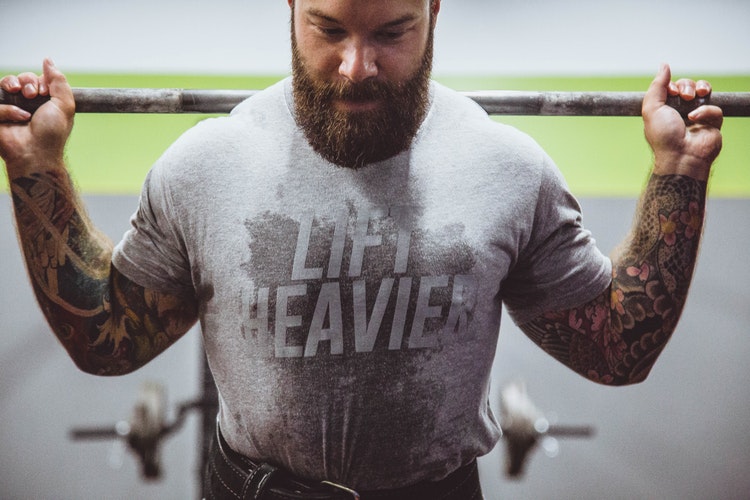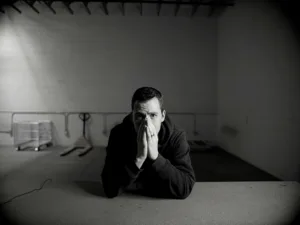Yes, men definitely can and do experience body image issues. If you are a male who is experiencing body image issues you are not alone.
However, body image issues are often considered exclusively the domain of women. The truth however, is that men can and do also have body image issues. In today’s pop culture landscape filled to the brim with super heroes, this shouldn’t be surprising.
So many men on our televisions and in the most popular movies have these incredible and unrealistic bodies.
Huge muscles with impossible to maintain physiques are incredibly intimidating for us guys. New vocabulary popping up in our vernacular, like the “dad bod”, sound like a joke but can be damaging to a man’s self esteem. These issues can cause self-conscious thoughts. They can lead to eating disorders, steroid abuse and other self-destructive behaviors.
The issue of women’s body image distortion in the media has been widely addressed. It’s a long road that we are walking very slowly. But with the prevalence of plus sized models increasing things are looking up.
Coupled with the insistence by many celebrity females on the use of non-doctored photos, this can only be a good thing for everyone. For men however, there is still a stigma hanging over the idea of even mentioning body image issues.
While it’s perfectly acceptable for a woman to complain that she is unhappy with her body, a man doing the same would likely be laughed at by his peers.
Women everywhere are speaking out about unnecessary sexualization Meanwhile, Magic Mike posters are plastered on the side of movie theaters. This is not to say that women don’t have serious body image problems. Or that we should ignore women’s pleas for real bodies to be shown in the media. Just to point out that the same problem exists for men and isn’t being readily addressed in a meaningful way.
With any new release of a superhero film, theaters and televisions everywhere are filled with men whose muscles are an amazing thing to behold.
There is an entire scene in the movie in which several characters, both male and female, marvel at the size of Thor’s (Chris Hemsworth) muscles. Yes, his physique is definitely impressive, but what no one ever talks about is how he came to look that way.
Along with his fellow super heroes, it’s important to remember that their entire job is to look a certain way. When they aren’t filming, and sometimes even when they are, these men are spending hours at the gym. They have the luxury of doing this because they are actually getting paid to do it.
They landed these roles based on how they looked and continue to make money to maintain a certain look. The average dad with two or three kids and a nine-five office job just doesn’t have four or five hours a day to spend at the gym.
Yet men continue to compare themselves to what they see on the screen, especially when it is presented as the ideal.
The sexy, perfect man has large, rippling arm muscles and a six pack. And it’s not just adult males. In the opening episode of the popular teens show, Riverdale, a character comments on another male character’s six-pack abs as being “six more reasons to date him.”
This sends the message to teen boys everywhere that having a six pack will help you get a date. We hear this often in our therapy office: young men talk about the pressure on social media to have a certain body type. This disturbing trend shows how very young men and boys are getting a message that they must have a unrealistic body type to attract followers and likes on social media.
the “ideal man’s body” in media is the macho man image that so many men are unreasonably expected to maintain.
This expectation of not showing weakness or being overly emotional make it so men feel like they can’t speak out about their feelings. Body image issues fester under the surface, comparing oneself to superheroes on the big screen but never being able to talk about it.
Consider the typical group family barbecue. It would be perfectly acceptable for a group of wives or moms to sit together and discuss their bodies. They trade diet ideas and recipes. And, they try to convince each other that they don’t look as bad as they see in the mirror. Now let’s look at the husbands and fathers in the same scenario.
Body image is definitely not a common conversation topic for men.
Standing around the barbecue, cooking fatty meats and sausages, maybe drinking a beer. Can you imagine this hypothetical group of men discussing their love handles? Or how to lose that winter weight they put on at Christmas? Probably not.
Men fear or worry they’ll be ridiculed.
A woman saying to her peers that she feels badly about how she looks is accepted and offered sympathy and words of advice or encouragement. Can a man in that situation say the same? Or would his peers tell him to “man up”?
Memes on the internet talking about the “dad bod”—a man with a bit of a belly—can be damaging and hurtful. Or those pictures that circle social media every few weeks asking, “do you even lift bro?” as if a man who doesn’t have time or doesn’t want to go to the gym is somehow lacking. These are all played for laughs. Similar memes or discussion of women’s bodies is quickly being shut down as unacceptable. We need to do the same thing for the men in our lives.
All of this can add up to a toxic combination for men.
Damaging thoughts can lead to self destructive behaviors. Like body image issues, eating disorders are often considered the domain of women. You don’t hear about men with anorexia. Or a man rushing to the bathroom after a meal to purge. But it happens, more often than most people imagine.
In an effort to replicate the bodies seen on TV, men may also turn to steroid abuse. Which can lead to serious health complications or even death. They obsessively work out at the gym or stay long hours at the office.
Men’s body image problems often stem from earlier life experiences in which the male was made to feel “less than” or “not enough.”
This negative message often become a belief they have about themselves. As they enter adolescence, these guys are more susceptible to the unrealistic body image in the media. They come to our office with early emotional trauma and current body image issues. Fortunately, we have been able to successfully resolve these issues.
Male body image issues are a conversation that men need to start having with their friend, wives, doctors etc.
Bringing it up forces this issue into the open where it belongs. Subsequently, more men get help. Either to feel better and lead happier lives or save themselves from serious illness and health problems. At Denver Men’s Therapy, we are here to get these negative thoughts out of the way so you can be a strong, fun loving and awesome partner again.















